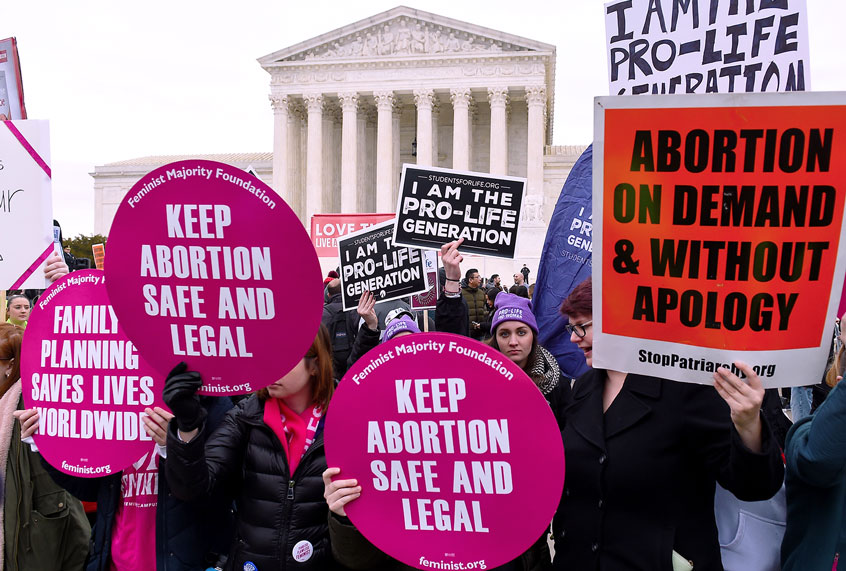Last week, when the state of Louisiana argued before the Supreme Court in June Medical Services v. Russo, they had a very specific message about people like me who provide abortion care. In addition to their effort to save a law that would severely limit abortion access, Louisiana and its allies are asking the Supreme Court to rule that abortion providers and clinics no longer have the standing to challenge abortion restrictions on behalf of their patients. Their arguments are based on the flawed notion that our interests are at odds with our patients, that the abortion restrictions they pass are designed to protect our patients from people like us.
I wish the justices could spend a day alongside the people I care for. I believe the experience would make the caricature of abortion providers ring as hollow for them as it does for me.
In my job at the University of California, San Francisco, I work with pregnant people our healthcare system has cast aside. These individuals are experiencing incarceration or homelessness, have substance use disorders or significant mental illness. My first challenge is to build enough trust to help these individuals engage with the healthcare system at all. Their trauma runs deep, back to childhoods in the foster system or nights living on the streets. When they’ve tried to engage in care, they’ve been ignored or poorly treated. Their kids have been taken away by a Child Protective Services System steeped in a long history of racism. They’ve left their belongings in a tent on the street to go to the doctor, knowing their things might be vandalized or stolen, only to be berated for being late or forced to wait for hours.
I can’t change what’s happened in the past, but I can try to change my patients’ experiences with the healthcare system now and in the future. That requires fostering a deep level of trust that can’t be built in an instant. The first time I see a patient might be after she’s had a mandatory pregnancy test in jail, dealing with multiple blows of unexpected news. It might be in an emergency room or on the street. I let my patients know my main job is to listen and help them make decisions about the care they want and need. When someone is pregnant, that means saying, throughout the course of their pregnancy, that I am with them every step of the way no matter what they choose.
I go into these conversations knowing that their trauma at the hands of the healthcare system has reinforced stigma around their reproductive goals. They’ve heard again and again that they don’t deserve to build a family. I assure people that I believe in their ability to parent, whether it’s now or in the future. I also recognize that as chaotic as their lives can be, their needs and desires may change.
One patient I met in jail thought she would be released right away and wanted to build her family. I provided her prenatal care and talked with her about her pregnancy plans. She then found out she would be incarcerated for longer than she expected. She was devastated by the idea of being separated from her kids at home. We discussed her options and her desires over the course of a few weeks, and she ultimately decided to have an abortion. We talked regularly to ensure that the abortion was what she really wanted. It was an incredibly emotional and intense decision for her. I saw her a year later and she was thriving, back with her kids, and working as a counselor at a substance use recovery program. She talked about how the abortion was so important for her own recovery and made her a better parent.
Another patient with a substance use disorder came to us when it was too late for her to have the abortion she wanted. We helped her plan around an adoption. The entire birth center rallied around her, and she had one of the most beautiful births I’ve ever seen. An experience that could have been weighed down with stigma and judgment was surrounded by love and support.
Giving birth can be transformative. Having an abortion can be transformative. If we don’t give people the opportunity to pursue the decision that is right for them, we’re compounding their trauma and creating new obstacles to recovery and wellness. Our job as doctors who provide abortion care—whether we meet patients at a shelter, clinic, hospital or anywhere else—is to provide them the care that is right for them, with compassion and free from judgment.
The people I serve persevere in the face of barriers most of us couldn’t begin to imagine. As they focus on survival in the context of sometimes insurmountable oppressions, their energies cannot be focused on advocating for their own reproductive rights. Rather, it is my job to challenge restrictions to their reproductive autonomy, centering my work on their needs and goals, just as I do every day in my clinical practice.
My relationship with patients couldn’t be farther from the one portrayed by Louisiana as part of its agenda to roll back abortion access. The Supreme Court should continue to allow people who provide abortion care to stand up in court on behalf of our patients, as yet another essential way we provide care that puts our patients first.

